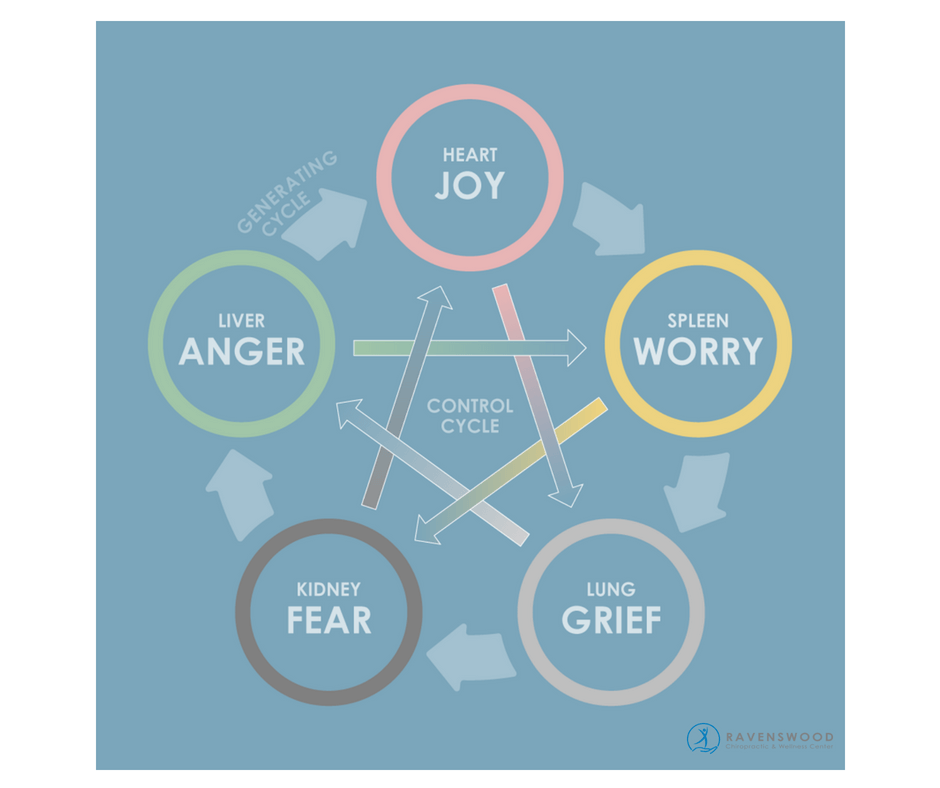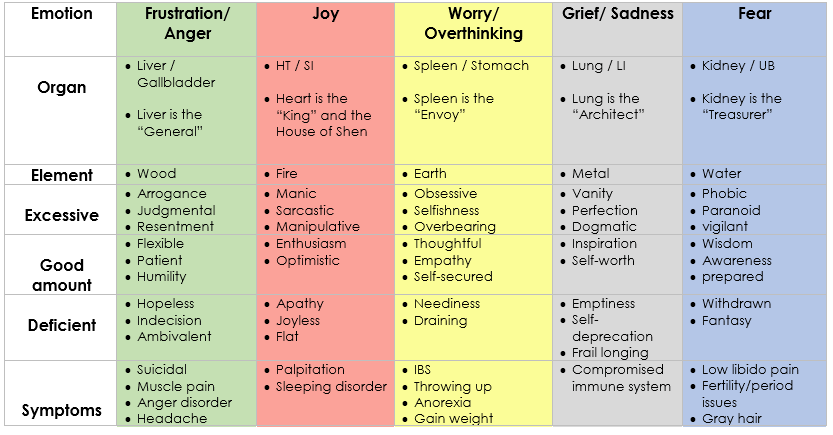Emotional Health and Acupuncture
Can Emotions Manifest As Disease ?
In Traditional Chinese medicine (TCM), there is the phrase “san yin”. San means “three” and yin means “cause” or “reason”. The term means that there are three major causes of disease. These are external, neutral and internal. Let’s take a look at each one in more detail:
External Causes of Disease
The external causes of diseases are “evils” or pathogens originating from outside the body. These are also known as environmental excesses like wind, cold, damp, heat, summer heat and dryness. These evils invade the body from the exterior, and if there is a weakness in your body’s defensive qi, they can penetrate deep into your system and cause disease. In TCM, your body’s defensive qi is what protects you from such attacks. Having strong defensive qi relies on the health of your Lungs, and if you have a weakness here, you may be more vulnerable to the external causes of disease.
Neutral Causes of Disease
The neutral causes of disease, also known as the miscellaneous causes of illness, is a broad category. It includes lifestyle choices combined with other internal and external factors including diet, sex, overwork, lack of exercise, trauma and parasites.
Internal Causes of Disease
The internal causes of disease originate from inside the body. They are also known as the “seven affects” and they are joy, anger, anxiety, preoccupation, sorrow, fear, and fright. Each of these emotions affects a particular organ as can be seen below. This shows how in TCM, strong feelings can easily result in disease. In fact, TCM sees emotions as a big part of the cause of illness.
What is Normal Emotional Health?
Everybody feels all of the emotions and moves through them at different points in their lives. It is normal to have all the feelings at different times, but not to sit with any one of them for too long.
Not feeling certain emotions or getting stuck on one feeling can affect the associated organ(s), causing imbalance. This is how an emotional pathogen damages an organ, resulting in disease.
If you do not have enough energy to move out of this emotion, you become even more stuck. Over time, the original imbalance begins to spread to the other organs causing further issues and creating a negative cycle which is difficult to break.
How Emotions Can Manifest as Disease
 Because each organ is linked to an emotion, the pathology of being stuck on one emotion, or not experiencing a particular emotion at all, affects that organ. Because the organs are linked together, one organ out of balance too much or for too long will create a chain reaction effect throughout the whole body. The organs and thus emotions are linked together by two cycles, one of birth and nourishment, and one of control.
Because each organ is linked to an emotion, the pathology of being stuck on one emotion, or not experiencing a particular emotion at all, affects that organ. Because the organs are linked together, one organ out of balance too much or for too long will create a chain reaction effect throughout the whole body. The organs and thus emotions are linked together by two cycles, one of birth and nourishment, and one of control.
In the first cycle, which links the organs in a clockwise circle, the organs feed and support one another in a mother-child type of relationship. This means that any sickness in the mother organ can easily affect the child. Equally, if the child organ is sick, the mother may become distressed too.
In the second cycle, which flows between the organs like a five-pointed star, the organs control and regulate one another. If one organ becomes imbalanced, it may over-control or under-control its partner, causing that to become imbalanced too. In this way, disease spreads from organ to organ, causing multiple symptoms throughout the body.
The Symptoms of Emotional Stress
Emotional stress can cause a wide range of symptoms throughout the body. You may be able to relate to stress causing symptoms such as muscle tightness, palpitations, changes in bowel movements, immune system weakness, fertility issues and menstrual cycle changes.
Stress hormones are responsible for all of those symptoms, but not everyone’s symptoms are the same. So why do the symptoms of long-term stress not manifest in the same way for everyone?
In Chinese Medicine, different symptoms develop depending on your constitution and where your weakest link is. Every individual has a different physiological make-up and may respond differently to the same situation.
While one person can get cut off by another driver and be angry but move through the emotion by the end of the block, another person might still be mad when they get home. This may cause a bad mood and more things to be angry about. If your mind sits with anger for too long, then it restricts the flow of qi in your Liver. This can lead to a variety of symptoms including muscle tightness, tension headaches, temporomandibular joint disorders (TMJD), bruxism (teeth grinding), tinnitus (ringing in the ears), and tendonitis flare-ups.
This demonstrates that it is normal to experience all of the emotions, but moderation is key. Experiencing an emotion and then moving on allows qi to flow freely in and between the meridians. This ensures smooth and even transition between the organs and keeps your body in a state of health. If qi becomes “stuck” due to emotional factors, it can be an obstacle to the functioning of the meridian.
We have already looked at how excessive anger can affect your Liver causing your qi to become stuck, but even too much joy can hurt your body!
The Heart is associated with joy, and weakness and malfunctioning of the Heart would cause palpitations, tightness of the chest, difficulty sleeping, high blood pressure and so on. And you can guess what is coming next – tiredness, loss of interest and a weakened immune system. This all happens because a lack of joy, or too much joy, affects the Heart meridian.
The Lungs are associated with sadness and grief. Lung imbalances manifest in signs of depression and an inability to look forward due to loss or traumatic events in our life. These emotions can affect your Lungs causing weakness, crying spells, sobbing, asthma, allergies, and a weak immune system.
The Kidneys are associated with fear. If you are fearful, it affects your Kidneys and may cause lack of energy, lower back pain, sexual dysfunction and fertility issues. Fear also often comes with worry as the Kidneys are controlled by the Spleen. When you worry excessively, with too many things on your mind, you can get stuck in fear, and this results in panic attacks, avoidance of social activities and phobias.
The Spleen is affected by worry and overthinking. This causes indigestion, IBS, eating disorders, constipation, heartburn and water retention. It also worsens inflammatory conditions causing tiredness, difficulty thinking straight, and a heavy feeling throughout your body. Your spleen is a tender and soft organ. It is controlled by your Liver, and when you have too much anger, your Spleen is over-controlled and cannot do its job correctly. This is the mechanism behind an upset stomach resulting from angry emotions.
Keeping Your Emotions Balanced
In Chinese medicine, suppressing your feelings is not suggested. It is normal to feel all the emotions, and you do not have to hide them, but expose them and move through them smoothly. A good work-life balance is essential for keeping your emotions well regulated, whereas alcohol and substance use both contribute to emotional imbalance and should be avoided.
Acupuncture can also help with many diseases caused by stuck emotions. It can help to move you out of the bad cycle and restore balance and health. Acupuncture and Chinese medicine treats emotional imbalance at a deep level by identifying the cause of the condition (i.e., the organ that went out of balance first). As well as treating that organ directly, acupuncture also moves and circulates the qi and blood better within the body. This creates nourishment, healing, and relaxation, which cleanses and restores balance to the organs.
Since acupuncture and Chinese medicine create a kind of internal movement, some patients may experience even more emotions or stronger emotions than usual during the first part of treatment. This is a regular part of the healing process, and by the time you complete a full course, you should have enough energy to break the dangerous cycle and feel free and secure with your mind and your body.
Dr. Marlena Siroki, DACM, L.Ac. is an Acupuncturist in Chicago at Ravenswood Chiropractic & Wellness Center in Andersonville. Dr. Marlena, DACM, L.Ac., received her Doctor of Acupuncture and Chinese Medicine from Pacific College of Oriental Medicine in Chicago. She is a Nationally Board-Certified Acupuncturist and Herbalist and Diplomate of Oriental Medicine, certified by the National Certificate Commission for Acupuncture and Oriental Medicine.











